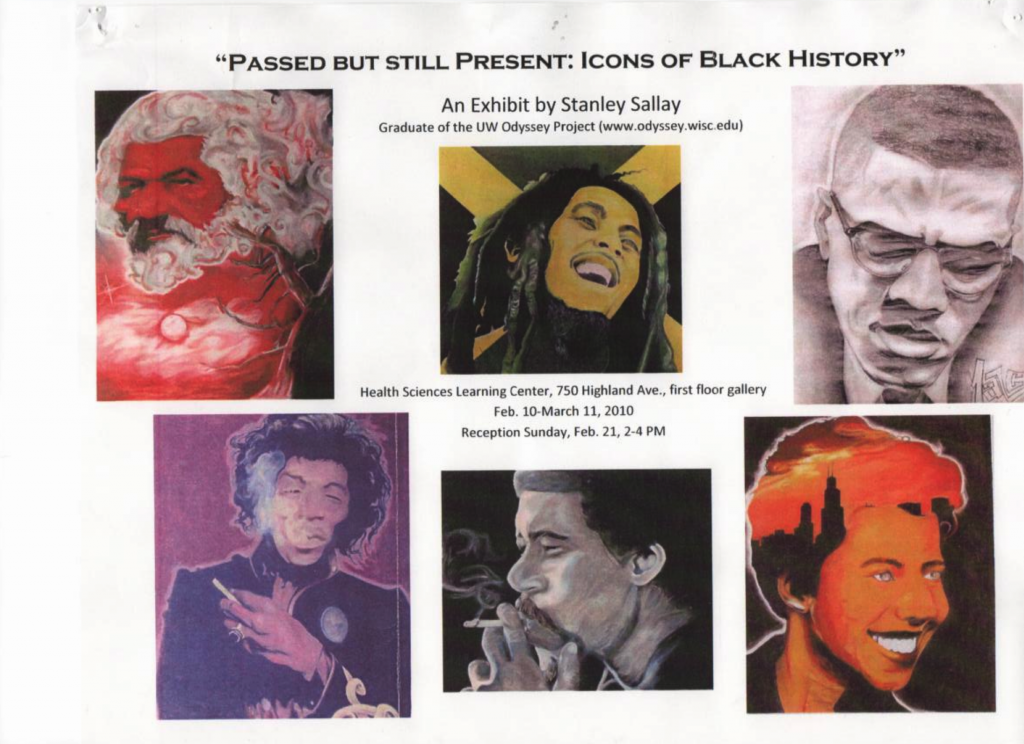Odyssey graduate applies his talents
by Cadence Bambenek
Oftentimes, individuals aren’t the best at recognizing their own unique skills and it can take a little help along the way for them to find their identity.
The Odyssey Project, an initiative through the University of Wisconsin Division of Continuing Studies, offers free tuition and textbooks to support 30 low-income adults as they enroll in a year-long, six-credit humanities course each year.
Director Emily Auerbach said the course is designed to give people who live in poverty access to an education that would be otherwise difficult to receive.
The Project, in its thirteenth year, has helped more than 300 low-income adults since its inception.
Stanley Sallay, a 2007 graduate of the Odyssey Project, is just one of the many helped.
Growing up, Sallay spent alternating stretches of time between Madison and the Southside of Chicago.
“The Odyssey Project had a huge impact on my life because the environment I grew up in, you know, for all of the people around me college simply wasn’t a big thing everybody was thinking about. It was really not even an option,” Sallay said.“The perception we had about college was that you had to have money to go to college. If you didn’t have money you had to get some type of scholarship, you know sports or some type of academic scholarship for getting good grades in high school. So I really wasn’t even thinking about college until I heard about the Odyssey Project.”
Sallay first heard about the Odyssey Project through his partner, CaSandra Lyons, who completed the Odyssey Project in 2006 after a recommendation from her best friend, Tineisha Scott. Scott had graduated in the second class of the program, back in 2005.
Auerbach and her colleague, Jean Feraca, began the Odyssey Project in 2003. While working at Wisconsin Public Radio, Feraca learned about a program in New York, The Clemente Course in the Humanities, which worked to introduce adults below the poverty line to the humanities. She wanted to introduce a similar program to UW-Madison.
The 30 participants are screened through written applications and an interview process, Auerbach said.
“We look for students who have a hunger to learn—for people for who being in the class could change their lives,” Auerbach said.
Sallay said that he was admitted to the Odyssey Project at the age of 23.
“You have to have a strong argument for why you should be in the Odyssey project,” Sallay said. “So I submitted my essay and was accepted.”
After the year-long course, about two-thirds of course graduates go on to further their education in some way or another, with many continuing to use the Odyssey Project for support and resources as they build on their education.
“The Odyssey Project is really about jump-starting what you want to do, it’s not the end,” Sallay said. “Nothing is going to happen overnight, you have to put in the work. But it gives you the motivation to pursue what you always wanted to do but never thought you could.”
Sallay said he had put art aside since high school until the Odyssey Project.
Auerbach recalled when she originally noticed Sallay’s artistic talents and encouraged him to sketch some of the famous authors and characters that they were studying in class, from Socrates to Malcolm X.
The portraits were beautiful, Auerbach said, so she encouraged him to make a career out of his art.
“I thought she was joking,” Sallay laughed. “Like, you can’t make a career out of art. But I went on to get a Graphic Arts degree.”
In 2010, Sallay was awarded an art gallery to display his collection of black icon portraits. Sallay then completed a Graphic Arts degree from Madison College in 2014.
Last February, Sallay was working at a factory when Auerbach invited him to have a grand opening at the Partnership Space, where Odyssey classes are currently held. Auerbach introduced Sallay to Jeff Russell, the Dean of the UW Division of Continuing Studies. Auerbach told Russell that Sallay was an artist, and they set up an interview.
Auerbach said Sallay was given a temporary position as a graphic designer for the Division of Continuing Studies, but was promoted to the permanent position of Design Media Specialist in September.
“I’ve been here since March, March 16th,” Stanley smiled.
“It was a win-win situation. It wasn’t an, ‘Oh, look. How nice for Stanley.’ My co-workers are ecstatic with his work,” Auerbach said.
“I’m most proud of having a career as opposed to having a job,” Sallay said. “I had jobs for, you know, forever. I had jobs working in warehouses and waking up in the morning and ‘Oh god. I have to endure this for the next eight or ten hours.’”
But Sallay doesn’t really consider his current position as work, drawing a comparison between his artwork and basketball.
“You would still find an NBA star on a court, whether or not they were paid to be there,” Sallay said, just as he would still create, whether or not he was paid to create.
Now, Sallay wants to do more to apply his creativity and help other people highlight themselves. His ultimate goal is to create his own marketing firm.
“Branding is really what I like to do, you know? Create an identity for a brand or someone who doesn’t have one start from scratch, from ground zero and giving them a whole identity and clean look.”
 The Arc: Visions of justice
The Arc: Visions of justice
